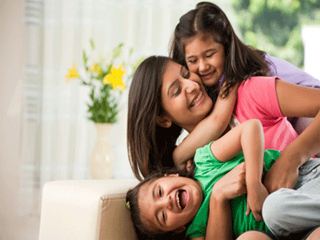
Weighed down by the responsibility of raising happy, health and respectful children, evidence shows that most parents and teachers want to help kids to be caring to others.
But while their carers might prioritise kindness children are apparently not getting the message -and instead value personal success over concern for others, according to a recent study at the Harvard Graduate School of Education.
Despite their carers’ efforts, almost 80 per cent of young people picked high achievement or personal happiness when asked what is most important to them, while a fifth said caring for others.
Researchers at the Ivy League university made their findings by assessing survey of 10,000 middle and high school students from 33 schools representing a diverse range of young people from across the US. They also used hundreds of conversations with young people and their parents over a decade.
“Our youth’s values appear to be awry, and the messages that adults are sending may be at the heart of the problem,” was the authors’ bleak assessment of the situation.
Researchers said the problem lies in what they call the rhetoric/reality gap: between what parents say are their priorities and the message they put forward on a daily basis.
And parents in affluent communities who pressure their children to be high achievers did not increase a child’s attainment level or happiness, according to the study. In addition, not prioritising caring for others made it more difficult children to form strong relationships – a vital part of a person’s well-being.
In light of their findings, the team formulated five tips to help parents and teachers instill the importance of caring in their children.
“The guidelines can help shift the balance toward children and youth caring for others and help them become caring, ethical family members, workers, and citizens,” the researchers said.
“Children and youth need on-going opportunities to practice caring and helpfulness, sometimes with guidance from adults”
The team stressed that anyone can become a “good person” and that learning to be kind and fair is like “learning to play an instrument”. “Daily repetition”, be it by helping a friend with the schoolwork or doing chores around the home, can “make caring second nature”.
“Children and youth need to learn to zoom in”
Young people must both listen to those around them, and try to understand the bigger picture, according to the experts. This enables a child to “expand their circle of concern” and makes it possible for them to “consider the justice of their communities and society.”
“Children and youth need strong moral role models”
The researchers stress that this does not mean that parents and teachers needs to be perfect or “have all the answers.” Rather, they emphasise “grappling with our flaws”, realising when you are wrong, and listening to children and students. This means that parents and teacher also need to “continually practice and zooming in and out”.
“Children need to be guided in managing destructive feelings”
“Often the ability to care for others is overwhelmed by anger, shame, envy, or other negative feelings,” said the reserachers. Therefore, adults must teach children that while such feelings are normal, they must be dealt properly and in “productive ways.”
The guidelines mirror the findings of a separate study, which showed that parents who manipulate their children into being who they want could turn them into mean adults.
Researchers at the University of Vermont came to their conclusion by studying the manner in which 180 college students recounted a painful event, such as a breakup, alongside the results of a survey into parental control over their lives.